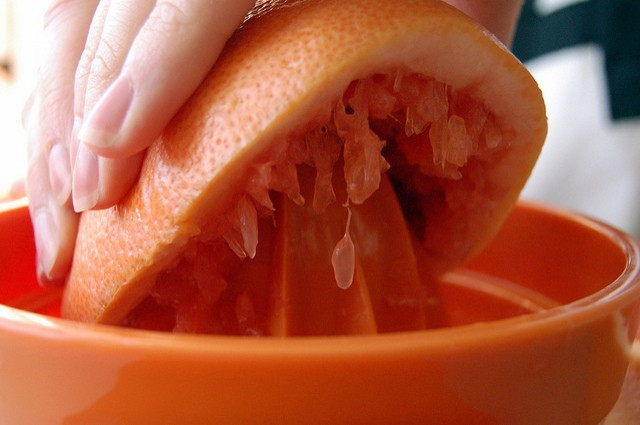Grapefruit Juices Up Cancer Treatment Doses

Grapefruit juice is known to increase the levels of the drug sirolimus in a patient's blood, which is why doctors advise patients against taking the two in tandem.
But a group of University of Chicago researchers now says that grapefruit juice's ability to raise drug levels in the bloodstream could mean that cancer patients could take lower doses of sirolimus, which could help them avoid side effects and save money on medication.
Sirolimus is an immunosuppressant drug also known as rapamycin. Though more commonly given to organ transplant recipients, sirolimus is thought to have potential benefits for cancer patients thanks to its ability to counter cell proliferation. Grapefruit juice, meanwhile, has the ability to block intestinal enzymes that break down sirolimus and other drugs, hence the warnings from pharmacists about taking it with certain medication.
University of Chicago researcher Ezra Cohen, the lead author of a new study in the journal Clinical Cancer Research, said in a statement Tuesday that he and his colleagues "wanted to see if grapefruit juice can be used in a controlled fashion to increase the availability and efficacy of sirolimus."
Cohen and his coauthors conducted three trials with 138 cancer patients, who either received just sirolimus, sirolimus and ketoconazole - another drug that can also slow the body's breakdown of sirolimus - or sirolimus and grapefruit juice.
For patients taking sirolimus alone, their optimal dose was 90 milligrams per week, according to the study. However, the patients also suffered from serious gastrointestinal problems when they took more than 45 mg of sirolimus per week, so they had to switch to 45 mg twice a week.
But patients that were taking ketoconazole in conjunction with sirolimus only needed 16 mg of sirolimus to maintain optimal levels of the anti-cancer drug in their blood. Patients drinking grapefruit juice needed just between 25 and 36 mg of sirolimus weekly.
The researchers pointed out that while ketoconazole has a slightly stronger effect, grapefruit juice carries no risk of overdose.
However, they noted that the effect of grapefruit juice on an individual patient may vary, and that they found that the clinical activity of canned grapefruit juice differed from frozen grapefruit concentrate.
"The variation in potency of the grapefruit juice itself may be far greater than the variation in the enzymes that break down sirolimus," Cohen said.
SOURCE: Cohen et al. "Phase I Studies of Sirolimus Alone or in Combination with Pharmacokinetic Modulators in Advanced Cancer Patients." Clinical Cancer Research published online 7 August 2012.
© Copyright IBTimes 2024. All rights reserved.





















